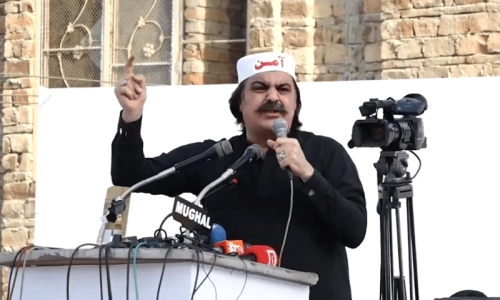ISLAMABAD: The National Assembly adopted a resolution on Tuesday demanding that what is regarded by many as a secular vision of the Quaid-i-Azam Mohammad Ali Jinnah about the status of religious minorities in Pakistan be adopted as the country’s roadmap for the future.
Some supporters of the resolution, moved by Ports and Shipping Minister Kamran Michael to mark Minorities’ Day, wanted the Quaid’s famous speech to Pakistan’s first Constituent Assembly on Aug 11, 1947, containing that vision, be made part of school and college curriculum to make the country’s youth aware of what its founder had visualised the new state to be like.
“The text of the historic Aug 11 speech is a beacon of light for us … and be regarded as a roadmap for the future,” said an opposition amendment to the Urdu text of the official resolution that recalled what it called the Quaid-i-Azam’s promise of “rights of equality” for all minorities living in Pakistan.
Also read: Minister tells NA of laws being made for child rights
There was no opposition to the resolution in the depleted house, though hardline religious scholars, like those in the government-allied Jamiat Ulema-i-Islam (JUI-F) and the opposition Jamaat-i-Islam, have in the past disputed a secular interpretation of the Quaid’s vision, which they say was actually of an Islamic state.
Leader of the Opposition Khursheed Ahmed Shah of the PPP, as well as his party colleague Nafeesa Shah and Pakistan Tehreek-i-Insaf (PTI) member Shirin Mazari, had insisted on the inclusion of a reference in the resolution to the Quaid-i-Azam’s speech to the Constituent Assembly before becoming the first governor general of the new state created with the partition of the British India.
Some key portions of the speech, which were allegedly blacked out by some previous regimes, were recalled in the house, such as: “You may belong to any religion or caste or creed – that has nothing to do with the business of the state.” He had also said in that speech: “You will find in course of time that Hindus would cease to be Hindus and Muslims would cease to be Muslims, not in the religious sense, because that is the personal faith of each individual, but in the political sense as citizens of the state.”
Some speakers from the minority communities as well as others complained of forced conversions of Hindu girls in Sindh to be married with Muslims and misuse of the controversial blasphemy law against Christians in Punjab forcing many members of the Hindu community to migrate to India and of Christian community to Western countries.
However, JUI-F member Asiya Nasir informed the house that a National Commission on Minorities set up by an executive order two years ago with representation of all parties was functioning “quite actively” as part of the present government’s efforts to bring the minorities in the mainstream and that a draft bill would come to parliament soon to give the commission a legal status.
In its resolution, the house saluted the minority communities for their contribution to national development, particularly in the fields of education, health, defence, constitution-framing and the war against terrorism and vowed to “continue to play our comprehensive role to uphold and ensure the rights of all religious minorities living in the country”.
Khursheed Shah thanked the government for maintaining the tradition of observing the Minorities Day started by the previous PPP government.
FOR AND AGAINST KALABAGH DAM: Earlier, the house saw the controversy over the proposed Kalabagh dam over the Indus revived during a lengthy inconclusive debate on a resolution tabled by a Muttahida Qaumi Movement member, Mohammad Muzammil Qureshi, calling for the construction of new water reservoirs to control water shortage.
Water and Power Minister Khawaja Mohammad Asif described the issue of water shortages as more important than that of power shortages and persuaded the chair to extend the debate to the next private members’ day to allow more lawmakers to speak before his response to their proposals.
Most opposition members demanded construction of dams on alternative sites and building small dams rather than going for Kalabagh dam which, they noted, had been opposed by three of the four provincial assemblies.
“Kalabagh can be built over our dead bodies,” a PPP member from Sindh, Abdul Sattar Bachani, said while his party colleague from the same province, Nawab Yusuf Talpur, said the dam’s rejection by three provincial assemblies should be considered a national consensus.
But Qaiser Ahmed Sheikh of the ruling PML-N, like some other party colleagues, in effect favoured the Kalabagh dam project, saying that factors like climate change due to global warming had altered the situation and necessitated a fresh look on the issue by experts.
Pakhtunkhwa Milli Awami Party chief Mahmood Khan Achakzai proposed an alternative dam at Khushal Garh in the south of Khyber Pakhtunkhwa.
Some PML-N members proposed that the government refer the controversy over Kalaabagh dam to a judicial commission whose decision should be accepted by all parties as had happened with PTI allegations of massive rigging in the 2013 general elections.
But Khawaja Asif shot down the proposal, saying parliament should not abdicate its power over what he called a “life and death” question.
FEMALE ANGER: Minister of State for Parliamentary Affairs Sheikh Aftab Ahmed faced a hard time against angry female members of opposition parties after he told the house that development funds had not been allocated to female members elected on reserved seats because of funds allocated to elected members from the same constituencies.
However, after much protest, he promised to arrange their meeting with Prime Minister Nawaz Sharif to find a way out.
Published in Dawn, August 12th, 2015
On a mobile phone? Get the Dawn Mobile App: Apple Store | Google Play















































